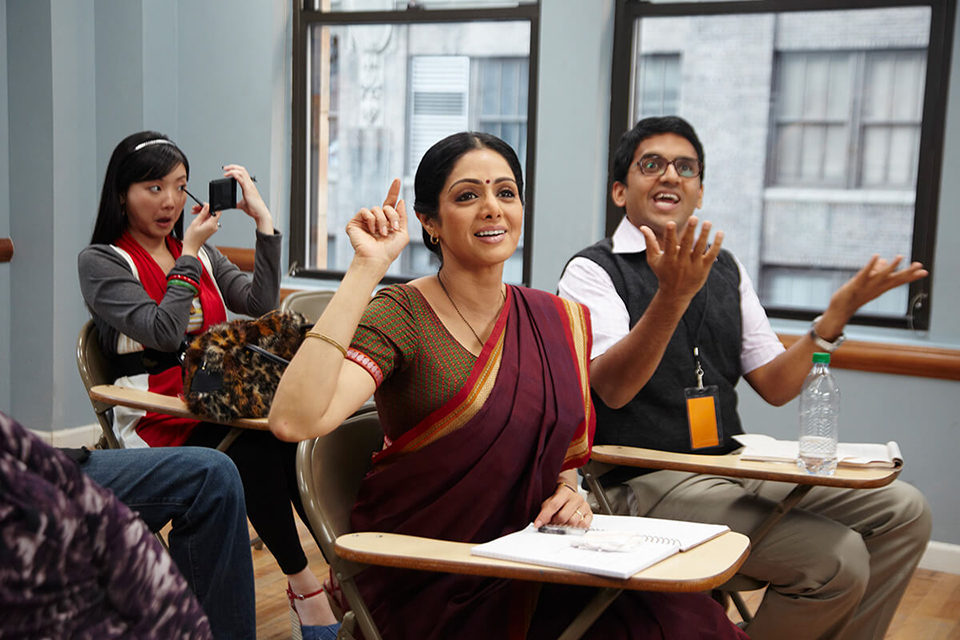
Mother Tongue
Though the 1983 film Himmatwala made the Indian actress Sridevi a star in Bollywood, she once claimed that she saw its success as a curse. “In Tamil films, they love to see me act naturally,” she lamented to the magazine India Today in 1987. “But in Hindi films all they want is a lot of glamour, richness, and masala. My bad luck was that my first big hit in Hindi films turned out to be a commercial one.” The exception came much later, with Gauri Shinde’s English Vinglish (2012).

Sridevi, who died in 2018 at 54, had been acting since she was 4, eschewing an education for a childhood spent on film sets. She was only 19 when she appeared in Himmatwala. By then she was already a force in South India, with the majority of her work in the languages of Tamil and Telugu. She essayed a variety of roles with tender honesty in Tamil when she was just a teenager: a village belle who experiences heartbreak (16 Vayathinile, 1977), a lonely singer who loves a con man (Johnny, 1980), a woman who suffers from amnesia (Moondram Pirai, 1982).
She climbed to the top of Bollywood in the ’80s and ’90s, perhaps popular Hindi cinema’s most artistically sterile period. Like Himmatwala, too many of these movies refused to take her seriously, rarely giving her the chance to dig beneath the surfaces of the women she portrayed. That she excelled in such circumstances constitutes a minor miracle. Still, she went on to become the nation’s first pan-Indian female superstar, reigning over the country’s three biggest film industries—Kollywood (Tamil), Tollywood (Telugu), and Bollywood (Hindi)—before retiring in 1997. Looking at her filmography during this period, one could still conclude that Hindi cinema never quite gave her the roles that plumbed the depth of her talent.
Shinde’s script for English Vinglish reportedly coaxed Sridevi out of her 15-year semi-retirement, giving her a role reminiscent of her South Indian, pre-Bollywood era. The film accents its central character, dimming any surrounding artifice. Sridevi’s hiatus seemed to unlock an entirely different side of a performer whom Hindi cinema had misused. English Vinglish is an ideal introduction for those unacquainted with Sridevi’s talents, showcasing how different schools of acting from North and South Indian cinemas could converge in a single performance.

Sridevi in English Vinglish (Courtesy of Hope Productions)
Sridevi is Shashi Godbole, a diffident—but not weak—housewife in the state of Maharashtra, who runs a booming dessert business from her home. She is taken for granted by her boorish husband (Adil Hussain) and her bratty daughter (Navika Kotia). Her inability to speak English, which those two family members take as evidence of her simplemindedness, makes her an easy object of mockery. Shashi is discontent with the idea of domestic confinement, though. A trip to New Jersey for a family wedding, her first time in America, plants an idea in her head: out of the gaze of her immediate family, she begins to sneak away to New York City to take English lessons, in hopes of proving her doubters wrong. Shashi’s journey to fluency coincides with an inner blossoming: she learns to love herself. On paper, both trajectories risk trafficking in treacly, inspirational uplift. Neither path is blandly linear, though, this precision a result of Sridevi’s meticulous performance.
It all starts with her voice. She speaks with a tremulous lilt, her tone carefully conveying a sense of displacement. Often, though, she needn’t speak at all. Sridevi’s eyes, which one character poetically describes as “two drops of coffee on a cloud of milk,” make their own declarations. Her reactive moments register with volcanic strength. When the family learns that she’ll be flying to America alone, Shashi’s son (Shivansh Kotia) begs to accompany her; her husband, dripping with disdain, scoffs that his son will be consigned to a life of cooking at home like Shashi does. Shashi’s smile dissolves into a frown with shocking speed. One can detect the exact moment when she feels the sting of his insult, her eyes welling up with humiliation. Later in the film, her husband casually jokes before a crowd that his wife was born to make laddoos. Shashi’s face widens in disbelief. It’s a flicker of a moment, only seconds long, yet Sridevi’s glance carries the weight of a cruel marital dynamic that has imprisoned her.
Such gestures involve actorly discipline, but Sridevi further endows them with spontaneity. She inhabits Shashi rather than condescending to her, such that the character’s naïveté never rings false. Lacking formal training, Sridevi possessed a beguiling mix of technique and impulse. She belonged to a generation of actors in Tamil cinema like Kamal Haasan and Rajinikanth who rose to fame in the ’70s and had their fingers on the pulse of the audience’s fundamental desires, reaching out to viewers without resorting to hollow theatrics. Sridevi herself was famously sheepish about speaking of her process, instead abiding by the maxim that the work should speak for itself, as she told the journalist Vir Sanghvi in a television interview in July 2017. This disregard for process meant that instinct guided her. Shekhar Kapur, who directed Cate Blanchett in Elizabeth (1998), called Sridevi “probably the best actor I’ve ever worked with” when recalling their collaboration on the Hindi-language Mr. India (1987): she submitted herself entirely to the camera in a way that did not feel studied or cerebral.

Sridevi in English Vinglish (Courtesy of Hope Productions)
One sees these qualities in English Vinglish despite the fact that the film has problems, chief among them its cardboard conception of characters in America. A particularly aggravating example comes in the form of a black female barista (Greer C. Morrison), whom Shinde casts as cartoonishly aggressive toward Shashi as she stumbles her way through a coffee order. Sridevi navigates the treachery of this scene with grace, dissolving into a fit of tears when those around her lampoon her difficulties with speaking English. The gravity of her heartbreak transcends the limitations of the scene as written. When Shashi runs out of the café, seeking refuge in a nearby park, one feels her world tightening around her. The anxiety is suffocating.
The film’s occasional deficiencies become especially frustrating in light of the fact that it was among Sridevi’s final acts. She died in February 2018 after drowning in a hotel bathtub in Dubai, joining a tragic lineage in Indian cinema of actresses who passed in their prime. This gallery of women includes veritable icons like Madhubala, Smita Patil, and Meena Kumari, all gone before they reached 40. Sridevi, though, was 54 at the time of her passing, an age that some might not associate with a female performer’s peak. Her final starring film, Ravi Udyawar’s Mom (2017), was released just months before her death, signaling the emergence of a performer like few India had ever seen: a leading female star over 50.
Today, Sridevi’s work in English Vinglish carries the subtext of her demise, the film standing not as the opening chapter to a rich second act but instead as a coda to a singular career. Still, it is a gift in itself. Her character’s eventual fulfillment feels triumphant because Sridevi creates such a full understanding of the pain Shashi once carried. Her hurt rarely needs any scenes of emotional outburst to announce itself to the audience.
An exception comes in a sequence midway through the film, when a call from her insouciant daughter sends her spiraling in anger. She can’t comprehend the child’s ingratitude, compelling her to vent to a French-speaking male classmate. “Am I a trash can to dump in whatever they feel like?” Shashi asks of her children, entirely in Hindi, as her commiserating companion struggles to keep up. The scene defies the film’s internal logic at first glance. He doesn’t speak Hindi, and her torrent is entirely in that mother tongue. How can he understand her? Yet it makes perfect sense: in this moment, Sridevi exceeds the bounds of spoken language with her force of feeling. You don’t need subtitles to know what she’s saying.
Mayukh Sen is a writer in New York. He has won a James Beard Award for his food writing, and he teaches food journalism at New York University. His first book, on the immigrant women who have shaped food in America, will be published by W.W. Norton & Company in fall 2021.







